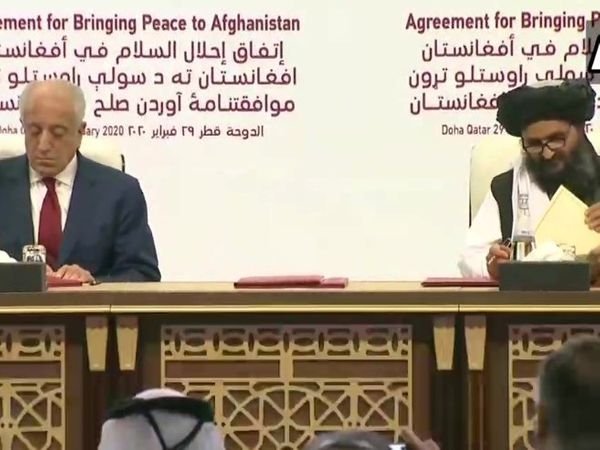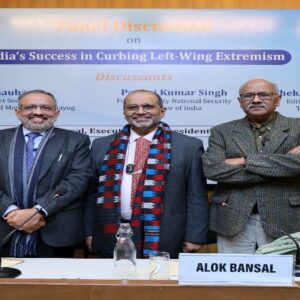Stakeholders in the 19-year old US-Taliban war in Afghanistan exude happiness over the signing of the peace deal on Saturday in Doha, the capital of Qatar. It is more than a year that the sides were pursuing the deal but hurdles cropped up unexpectedly only to defer the clenching of the peace. The last time peace talks were suspended by President Trump when, in retaliation to the killing of an American soldier by the Taliban in Afghanistan, he had broken negotiations unilaterally. However, it took a great deal of effort on the part of peaceniks on both sides to put things back on the rails and resume talks.
The highlights of the deal are that the US has agreed that the US and NATO troops would be withdrawn fully from Afghanistan in a phased manner in 14 months. Taliban leadership agreed to initiate talks with the government of President Ashraf Ghani for a negotiated settlement that would give Afghanistan a popular government. The Taliban would be partners in the new government. Prisoners of war will be released on both sides and the negotiated settlement would take up the question of reconstruction of Afghanistan and resumption of its normal trade and diplomatic relations.
This peace deal has come after the seven days no fighting pre-requisite was met on both sides so that the signing of the deal would not run into more trouble. Now that the deal is signed and both sides, after having felt the exhaustion of fighting a protracted war, would like to focus on rebuilding the war-ravaged Afghanistan.
A few lessons have to be learned from this long-awaited event. In the first place, it has become clear to the world that Afghans have maintained their age-old tradition of not allowing any foreign power to rule over it through force of arms. Some critics feel that the Doha deal is the second defeat of the US after Vietnam and that probably Washington will take a lesson from it while conducting its policy of belligerence. For the Afghan dissidents called Taliban, there is a lesson that they are not invincible if they mean to be obstinate and unrealistic. Whatever tall claims the Taliban may make, the US did manage to install a pro-US government in Kabul and make it sustain the bloody war imposed on it by the Taliban.
Pakistan has succeeded in establishing its importance in finding a solution to the Afghan crisis. Pakistan’s closeness to the Taliban or some of the prominent factions of the Taliban like the Haqqani group gives her leverage in the affairs of Afghanistan. Duringhis recent Indian trip, President Trump had acknowledged that Pakistan’s support to peace talks in Afghanistan was of immense importance. Hence Pakistan has made its position strong in influencing the future events and politics of the Kabul regime.
India will welcome the peace deal no doubt because it will have an impact on the regional ground situation. But there are some concerns which India will have to take note of. Though Indian Ambassador in Qatar was invited and did attend the signing ceremony in Doha on Saturday, yet in his address, the Taliban main negotiator Mulla Baradar did not take the name of India while expressing thanks to the countries that lent their support for the success of the Doha agreement. He made a specific mention of Pakistan, Uzbekistan, and Russia but ignored India. This is quite significant and one may infer that at some point during a discussion on the preliminaries, Pakistan must have put its foot down and demanded that India be excluded from the negotiating process. It was only on the behest of the US that the Indian representative was among the invited visitors.
Yet one more concern for India is that once inter-Afghan talks proceed and as a result a coalition government is established in Kabul to replace the present regime, the Taliban component on the behest of Pakistan will come out against India in respect of Kashmir issue. Taliban may not encourage its mujahids to comply with the wishes of Pakistani hawks of infiltrating into the Indian part of Kashmir but on a political level, the Taliban will certainly try to put their weight behind the stand of Pakistan on Kashmir. However, this fear could be discounted only if Indian policy planners had been shrewd enough to have established liaison with the Taliban leadership in past years that India is interested in maintaining a traditional friendship with the Afghans and has never tried to play one Afghan group against the other. If there have been sporadic attacks on Indian interests in Afghanistan, these were spearheaded by Pakistani agencies.
Much depends on the outlines along which the Ashraf Ghani regime in Kabul conducts talks with the Taliban leadership. But before we can anticipate the outcome of those negotiations, there is another issue that has cropped up lately. Differences between President Ashraf Ghani and his rival Abdullah Abdullah have deepened so much so that the latter had threatened to declare a parallel government. Though New Delhi will meticulously keep itself aloof of this rivalry among the top Afghan leadership, it has to be remembered that Abdullah Abdullah comes from the Panjsheer Valley in Northern Afghanistan and was a close ally of Ahmad Shah Masud who, in turn, had very cordial relations with New Delhi. Even Abdullah Abdullah has completed his education in an Indian Engineering Institute and has very `cordial relations with India. New Delhi would very much like to see the rivalry between the two Afghan contestants being resolved amicably to the satisfaction of all stakeholders. India has often tried to assure the Afghans that she is interested in the development and prosperity fo Afghanistan and has no other motive in cultivating the friendship of Afghan regimes.
The US has said that it will keep close track of the negotiations conducted in Kabul between the regime and Taliban to ensure that there is no breakdown and the story of post- Soviet withdrawal from Afghanistan is not repeated. In the same vein, India would not want that Kabul should turn into a hotbed of rivalry between the two sub-continental nuclear powers. As such, all eyes will be focused on the Taliban leadership how it conducts itself at negotiating a peace deal with the regime of Ashraf Ghani. Before that, a breakthrough in the stalemate existing between the two Afghan leaders claiming the high office of the presidency has to happen. Once that hurdle is overcome, chances for a feeling of lasting peace will brighten in Afghanistan. Such a scenario will have a positive impact on the political atmosphere of the sub-continent.
*The writer is the former Director of the Centre of Central Asian Studies, Kashmir University





